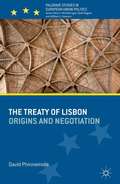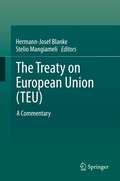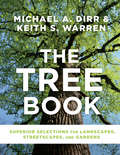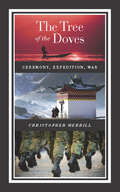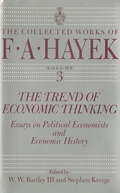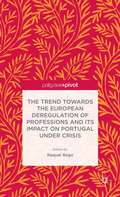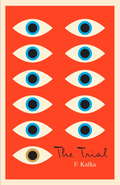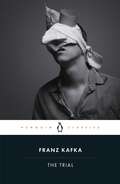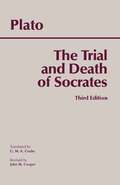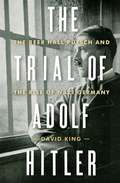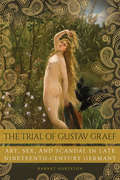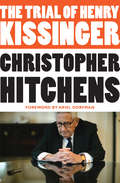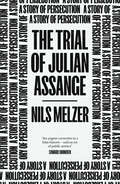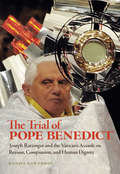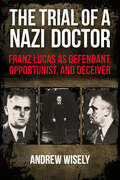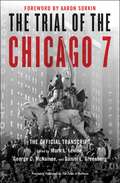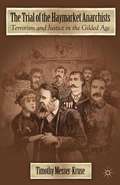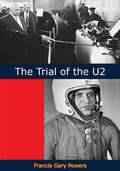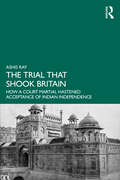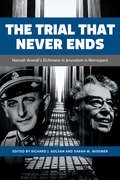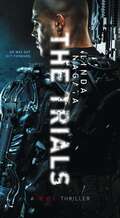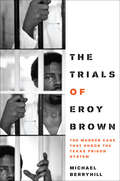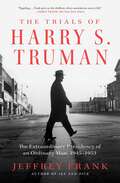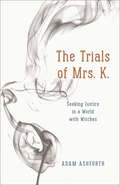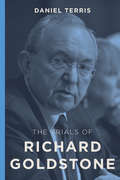- Table View
- List View
The Treaty of Lisbon
by David PhinnemoreDetailed and comprehensive analysis of how the Treaty of Lisbon emerged in 2007 this book explores the role played by the German Council Presidency and the EU's institutional actors in securing agreement among the leaders of member states on an intergovernmental conference as well as a new treaty text to replace the rejected Constitutional Treaty.
The Treaty on European Union (TEU)
by Stelio Mangiameli Hermann-Josef BlankeThe major Commentary on the Treaty on European Union (TEU) is a European project that aims to contribute to the development of ever closer conceptual and dogmatic standpoints with regard to the creation of a "Europeanised research on Union law". This publication in English contains detailed explanations, article by article, on all the provisions of the TEU as well as on several Protocols and Declarations, including the Protocols No 1, 2 and 30 and Declaration No 17, having steady regard to the application of Union law in the national legal orders and its interpretation by the Court of Justice of the EU. The authors of the Commentary are academics from ten European states and different legal fields, some from a constitutional law background, others experts in the field of international law and EU law professionals. This should lead to more unity in European law notwithstanding all the legitimate diversity. The different traditions of constitutional law are reflected and mentioned by name thus striving for a common framework for European constitutional law.
The Tree Book: Superior Selections for Landscapes, Streetscapes, and Gardens
by Michael A. Dirr Keith S. Warren“A boon to all those who plant, care for, and love trees.”—Nina Bassuk, author of Trees in the Urban Landscape The Tree Book is the go-to reference to more than 2,400 species and cultivars, from two of the biggest names in horticulture—Michael A. Dirr and Keith S. Warren. The featured trees include those widely available in the nursery trade, some new and promising choices, and a selection of overlooked options that deserve renewed interest. Each tree profile includes the common and botanical names along with details on foliage; flowers, seeds, fruits, and cones; native range; adaptability; and popular uses in landscapes. The Tree Book is a must-have resource for landscapes architects, city foresters, horticulturists, and enthusiastic home gardeners.
The Tree of the Doves: Ceremony, Expedition, War
by Christopher Merrill“A unique travelogue” that “explores the nature of terror, its place in the post-9/11 world and how it unites and galvanizes those in the throes of it” (Kirkus Reviews).Using several ageless questions—“Where do we come from? Where are we going? What shall we do?”—as his point of departure, journalist and award-winning poet Christopher Merrill explores the related issues of terror, modernity, tradition, and epochal transformation. In three extended essays, Merrill observes the performance of a banned ritual in the Malaysian province of Kelatan; traces Saint-John Perse’s epic voyage from Beijing to Ulan Bator in 1921 and relates it to the China of today; and embarks on a trip across the Levant in 2007 in the wake of the American wars in Iraq and Afghanistan.Merrill asserts that it is in this trinity of human actions—ceremony, expedition, war: all devised to keep terror at bay—that history is formed, and that the technological, political, environmental, and social changes we are witnessing now presage the end of one order and the creation of another.“Merrill is a ‘writer’s writer’: he spins sentences made of gold.” —Publishers Weekly
The Trend of Economic Thinking: Essays on Political Economists and Economic History (The Collected Works of F. A. Hayek #3)
by F. A. Hayek“[A] history of economics from the times of Adam Smith, to [Hayek’s] own contemporary times where capitalism and communism were at each other’s throats.” —Midwest Book ReviewThe Iron Curtain has been cast aside. The Berlin Wall has fallen. Germany has been reunited. And F. A. Hayek’s forceful predictions of the inevitable failure of socialism and central economic planning are now rendered irrefutable. Yet Hayek still rightfully cautions us to heed his arguments, warning that “in economics you can never establish a truth once and for all but have always to convince every generation anew.”The Trend of Economic Thinking captures Hayek’s views on political economists and economic history—on Mandeville, Hume, Cantillon, Adam Smith, and Henry Thornton. Framed by insightful editorial notes, fifteen newly collected essays—including five previously unpublished pieces and two others never before available in English—provide a fascinating introduction to the historical context of political economy and the evolution of monetary practices. In a highlight of the collection, “On Being an Economist,” Hayek reflects on the influence of economists, the time required for new ideas to take hold, the best way to educate economic theorists, and the need to follow one’s own interests, often in opposition to fashionable beliefs. As always, the words of this outspoken scholar are sure to provoke debate.“Hayek, awarded the Nobel Memorial Prize in Economic Sciences in 1974, was a pioneer in monetary theory and one of the principal proponents of the libertarian philosophy . . . The essays, supplemented by editorial notes, provide an introduction to the historical context of political economy in Britain and the evolution of monetary practices.” —Reference & Research Book News
The Trend towards the European Deregulation of Professions and Its Impact on Portugal under Crisis
by Raquel RegoFor the first time, European professional deregulation is the focus of reflection by social scientists. This book explores how professional associations act as pressure groups and highlights the democratic regime that is prevailing and the potential convergence problems that Europe may face.
The Trial
by Franz KafkaWritten in 1914, The Trial is one of the most important novels of the twentieth century: the terrifying tale of Josef K., a respectable bank officer who is suddenly and inexplicably arrested and must defend himself against a charge about which he can get no information. Whether read as an existential tale, a parable, or a prophecy of the excesses of modern bureaucracy wedded to the madness of totalitarianism, Kafka's nightmare has resonated with chilling truth for generations of readers. This new edition is based upon the work of an international team of experts who have restored the text, the sequence of chapters, and their division to create a version that is as close as possible to the way the author left it.In his brilliant translation, Breon Mitchell masterfully reproduces the distinctive poetics of Kafka's prose, revealing a novel that is as full of energy and power as it was when it was first written.
The Trial (Penguin Modern Classics)
by Franz KafkaA terrifying psychological trip into the life of one Joseph K., an ordinary man who wakes up one day to find himself accused of a crime he did not commit, a crime whose nature is never revealed to him. Once arrested, he is released, but must report to court on a regular basis--an event that proves maddening, as nothing is ever resolved. As he grows more uncertain of his fate, his personal life--including work at a bank and his relations with his landlady and a young woman who lives next door--becomes increasingly unpredictable. As K. tries to gain control, he succeeds only in accelerating his own excruciating downward spiral.
The Trial and Death of Socrates, 3rd edition: Euthyphro, Apology, Crito, death scene from Phaedo (Hackett Classics)
by Plato G. M. A. Grube John M. CooperThe third edition of The Trial and Death of Socrates presents G. M. A. Grube's distinguished translations, as revised by John Cooper for Plato, Complete Works. A number of new or expanded footnotes are also included along with a Select Bibliography.
The Trial of Adolf Hitler: The Beer Hall Putsch and the Rise of Nazi Germany
by David KingOn the evening of November 8, 1923, the thirty-four-year-old Adolf Hitler stormed into a beer hall in Munich, fired his pistol in the air, and proclaimed a revolution. Seventeen hours later, all that remained of his bold move was a trail of destruction. Hitler was on the run from the police. His career seemed to be over. The Trial of Adolf Hitler tells the true story of the monumental criminal proceeding that followed when Hitler and nine other suspects were charged with high treason. Reporters from as far away as Argentina and Australia flocked to Munich for the sensational four-week spectacle. By its end, Hitler would transform the fiasco of the beer hall putsch into a stunning victory for the fledgling Nazi Party. It was this trial that thrust Hitler into the limelight, provided him with an unprecedented stage for his demagoguery, and set him on his improbable path to power. Based on trial transcripts, police files, and many other new sources, including some five hundred documents recently discovered from the Landsberg Prison record office, The Trial of Adolf Hitler is a gripping true story of crime and punishment--and a haunting failure of justice with catastrophic consequences.
The Trial of Gustav Graef: Art, Sex, and Scandal in Late Nineteenth-Century Germany
by Barnet HartstonAlthough largely forgotten now, the 1885 trial of German artist Gustav Graef was a seminal event for those who observed it. Graef, a celebrated sixty-four-year-old portraitist, was accused of perjury and sexual impropriety with underage models. On trial alongside him was one of his former models, the twenty-one-year-old Bertha Rother, who quickly became a central figure in the affair. As the case was being heard, images of Rother, including photographic reproductions of Graef's nude paintings of her, began to flood the art shops and bookstores of Berlin and spread across Europe. Spurred by this trade in images and by sensational coverage in the press, this former prostitute was transformed into an international sex symbol and a target of both public lust and scorn. Passionate discussions of the case echoed in the press for months, and the episode lasted in public memory for far longer. The Graef trial, however, was much more than a salacious story that served as public entertainment. The case inspired fierce political debates long after a verdict was delivered, including disputes about obscenity laws, the moral degeneracy of modern art and artists, the alleged pernicious effects of Jewish influence, legal restrictions on prostitution, the causes of urban criminality, the impact of sensationalized press coverage, and the requirements of bourgeois masculine honor. Above all, the case unleashed withering public criticism of a criminal justice system that many Germans agreed had become entirely dysfunctional. The story of the Graef trial offers a unique perspective on a German Empire that was at the height of its power, yet riven with deep political, social, and cultural divisions. This compelling study will appeal to historians and students of modern German and European history, as well as those interested in obscenity law and class and gender relations in nineteenth-century Europe.
The Trial of Henry Kissinger
by Christopher HitchensIn The Trial of Henry Kissinger, Christopher Hitchens shifts focus from Pinochet, Milosevic, Hussein, and Kim Jong-il to a man seemingly lauded and revered by the American people for what are undeniably war crimes: Henry Kissinger. Now available as a Signal paperback. Forget the regular cadre of war criminals that pollute our news headlines day in and day out; we need look no further than America's own celebrated leaders for a war criminal whose offenses rival those of the most heinous dictators in recent history: Henry Kissinger. Employing evidence based on firsthand testimony, unpublished documents, and new material uncovered by the Freedom of Information Act, and using only what would hold up in international courts of law, The Trial of Henry Kissinger outlines worldwide atrocities authorized by the former secretary of state -- among them "conspiracy to commit murder, kidnap, and torture." With the precision and tenacity reminiscent of a prosecutor presenting his case, Hitchens offers readers an unrepentant, honest portrait of Kissinger, and implores governments around the world, including our own, to swiftly bring him to justice.
The Trial of Julian Assange: A Story of Persecution
by Nils MelzerThe shocking story of the legal persecution of Wikileaks founder Julian Assange and the dangerous implications for the whistleblowers of the future.In July 2010, Wikileaks published Cablegate, one of the biggest leaks in the history of the US military, including evidence for war crimes and torture. In the aftermath Julian Assange, the founder and spokesman of Wikileaks, found himself at the center of a media storm, accused of hacking and later sexual assault. He spent the next seven years in asylum in the Ecuadorian embassy in London, fearful that he would be extradited to Sweden to face the accusations of assault and then sent to US. In 2019, Assange was handed over to the British police and, on the same day, the U.S. demanded his extradition. They threatened him with up to 175 years in prison for alleged espionage and computer fraud.At this point, Nils Melzer, UN Special Rapporteur on Torture, started his investigation into how the US and UK governments were working together to ensure a conviction. His findings are explosive, revealing that Assange has faced grave and systematic due process violations, judicial bias, collusion and manipulated evidence. He has been the victim of constant surveillance, defamation and threats. Melzer also gathered together consolidated medical evidence that proves that Assange has suffered prolonged psychological torture.Melzer&’s compelling investigation puts the UK and US state into the dock, showing how, through secrecy, impunity and, crucially, public indifference, unchecked power reveals a deeply undemocratic system. Furthermore, the Assange case sets a dangerous precedent: once telling the truth becomes a crime, censorship and tyranny will inevitably follow. The Trial of Julian Assange is told in three parts: the first explores Nils Melzer&’s own story about how he became involved in the case and why Assange&’s case falls under his mandate as the Special Rapporteur on Torture. The second section returns to 2010 when Wikileaks released the largest leak in the history of the U.S. military, exposing war crimes and corruption, and Nils makes the case that Swedish authorities manipulated charges against Assange to force his extradition to the US and publicly discredit him. In the third section, the author returns to 2019 and picks up the case as Ecuador kicks Assange out of the embassy and lays out the case as it currently stands, as well as the stakes involved for other potential whistleblowers trying to serve the public interest.
The Trial of Pope Benedict
by Daniel GawthropIn this persuasive new book, Daniel Gawthrop examines how Joseph Ratzinger (Pope Benedict XVI) systematically steered the Catholic Church to the far right, and what his shocking resignation means for the Church as it navigates a new world. By doing so, it reveals one of recent history's most astonishing tales of institutional power, religious bullying, and systemic abuse.
The Trial of a Nazi Doctor: Franz Lucas as Defendant, Opportunist, and Deceiver
by Andrew WiselyThe Trial of a Nazi Doctor examines the life of Franz Bernhard Lucas (1911-1994), an SS camp doctor with assignments in Auschwitz, Mauthausen, Stutthof, Ravensbrück, and Sachsenhausen. Covering his career during the Third Reich and then his prosecution after 1945, especially in the Frankfurt Auschwitz trial, Andrew Wisely explores the lies, obfuscations, misrepresentation, and confusions that Lucas himself created to deny, distract from or excuse his participation in the Nazi’s genocidal projects. By juxtaposing Lucas’s own testimonies and those of a wide range of witnesses: former camp inmates and Holocaust survivors; friends, colleagues, and relatives; and media observers, Wisely provides a nuanced study of witness testimonies and the moral identity of Holocaust perpetrators.
The Trial of the Chicago 7: The Official Transcript
by Daniel Greenberg Mark L. Levine George McNameeRepublished fifty years later to coincide with the release this fall of the film of the same title written and directed by Aaron Sorkin with an all-star cast, this is the classic account of perhaps the most infamous, and definitely the most entertaining, trial in recent American history.In the fall of 1969 eight prominent anti-Vietnam War activists were put on trial for conspiring to riot at the 1968 Democratic National Convention in Chicago. One of the eight, Black Panther cofounder Bobby Seale, was literally bound and gagged in court by order of the judge, Julius Hoffman, and his case was separated from that of the others. The activists, who included Abbie Hoffman, Jerry Rubin, and Tom Hayden, and their attorneys, William Kunstler and Leonard Weinglass, insisted that the First Amendment was on trial. Their witnesses were a virtual who&’s who of the 1960s counterculture: Allen Ginsberg, Timothy Leary, Arlo Guthrie, Judy Collins, Norman Mailer, among them. The defendants constantly interrupted to protest what they felt were unfair rulings by the judge. The trial became a circus, all the while receiving intense media coverage. The convictions that resulted were subsequently overturned on appeal, but the trial remained a political and cultural touchstone, a mirror of the deep divisions in the country. The Trial of the Chicago 7 consists of the highlights from trial testimony with a brief epilogue describing what later happened to the principal figures.
The Trial of the Haymarket Anarchists
by Timothy Messer-KruseThe Trial of the Haymarket Anarchists is the culmination of seven years of research into the 1886 Haymarket bombing and subsequent trial. It not only overturns the prevailing consensus on this event, it documents in detail how the basic facts, as far as they can be determined, have been distorted, obscured, or suppressed for seventy years.
The Trial of the U2: Exclusive Authorized Account of the Court Proceedings of the Case of Francis Gary Powers
by Harold J. Berman Francis Gary PowersFirst published in 1960, this is the only authorized account of the trial of Francis Gary Powers, the U-2 pilot shot down by the Soviet Union on May 1, 1960. The court proceedings were held before the Military Division of the Supreme Court of the U.S.S.R. in Moscow, Russia and commenced on August 17, 1960 and concluded on August 19, 1960.Includes introductory comments written by internationally renowned authority on Soviet law, Professor Harold J. Berman, and richly illustrated throughout with exclusive courtroom photos.An exclusive ringside seat at one of the most dramatic trials in modern times!
The Trial that Shook Britain: How a Court Martial Hastened Acceptance of Indian Independence
by Ashis RayThe Indian National Army (INA) trials of 1945–46 have generally been given short shrift by historians in their cataloguing of the Indian freedom movement. This book examines to what extent the trials had an impact on the final phase of India’s quest for independence. In so doing, it unveils that, while the Indian National Congress’s extended odyssey to win independence was essentially about a passive push-back, at a critical juncture of its campaign to extinguish British colonialism in India, it applauded and capitalised on the INA’s use of force. The central, explosive narrative is about Britain holding a court martial of three officers of the INA – Shah Nawaz Khan, Prem Sahgal and Gurbaksh Dhillon – convicting them, before a dramatic turn in events.The material unearthed by the book throws new light on a decisive juncture leading to the transfer of power in India. It will be indispensable for researchers interested in South Asia, especially the Indian freedom movement. It will be invaluable for students of history, colonialism, military studies, politics in pre-Partition India and law.
The TrialThat Never Ends: Hannah Arendt's 'Eichmann in Jerusalelm' in Retrospect
by Richard J. Golsan Sarah MisemerThe fiftieth anniversary of the Adolf Eichmann trial may have come and gone but in many countries around the world there is a renewed focus on the trial, Eichmann himself, and the nature of his crimes. This increased attention also stimulates scrutiny of Hannah Arendt’s influential and controversial work, Eichmann in Jerusalem. The contributors gathered together by Richard J. Golsan and Sarah M. Misemer in The Trial That Never Ends assess the contested legacy of Hannah Arendt’s famous book and the issues she raised: the "banality of evil", the possibility of justice in the aftermath of monstrous crimes, the right of Israel to kidnap and judge Eichmann, and the agency and role of victims. The contributors also interrogate Arendt’s own ambivalent attitudes towards race and critically interpret the nature of the crimes Eichmann committed in light of newly discovered Nazi documents. The Trial That Never Ends responds to new scholarship by Deborah Lipstadt, Bettina Stangneth, and Shoshana Felman and offers rich new ground for historical, legal, philosophical, and psychological speculation.
The Trials (The Red Trilogy #2)
by Linda NagataIn the wake of nuclear terrorism, a squad of elite soldiers must combat artificial intelligence and seek justice in this military political thriller, a sequel to The Red.Lieutenant James Shelley and his squad of US Army soldiers were on a quest for justice when they carried out the unauthorized mission known as First Light. They returned home to America to face a court-martial, determined to expose the corruption in the chain of command that compelled their actions. But in a country still reeling from the nuclear terrorism of Coma Day, the courtroom is just one battlefield of many.A new cycle of violence ignites when rumors of the elusive, rogue AI known as the Red go public—and Shelley is, once again, pulled into the fray. Challenged by his enemies, driven by ideals, Shelley feels compelled to act. But are the harrowing choices he makes really his own, or are they made for him, by the Red? And with millions of lives at stake in a game of nuclear cat-and-mouse, does the answer even matter?
The Trials of Eroy Brown: The Murder Case That Shook the Texas Prison System (Jack and Doris Smothers Series in Texas History, Life, and Culture)
by Michael Berryhill&“Berryhill&’s account of this infamous 30-year-old murder case . . . Provides a jarring portrait of a once-medieval state prison.&” —Publishers Weekly In April 1981, two white Texas prison officials died at the hands of a black inmate at the Ellis prison farm near Huntsville. Warden Wallace Pack and farm manager Billy Moore were the highest-ranking Texas prison officials ever to die in the line of duty. The warden was drowned face down in a ditch. The farm manager was shot once in the head with the warden&’s gun. The man who admitted to killing them, a burglar and robber named Eroy Brown, surrendered meekly, claiming self-defense. In any other era of Texas prison history, Brown&’s fate would have seemed certain: execution. But in 1980, federal judge William Wayne Justice had issued a sweeping civil rights ruling in which he found that prison officials had systematically and often brutally violated the rights of Texas inmates. In the light of that landmark prison civil rights case, Ruiz v. Estelle, Brown had a chance of being believed. The Trials of Eroy Brown, the first book devoted to Brown&’s astonishing defense, is based on trial documents, exhibits, and journalistic accounts of Brown&’s three trials, which ended in his acquittal. Michael Berryhill presents Brown&’s story in his own words, set against the backdrop of the chilling plantation mentality of Texas prisons. Brown&’s attorneys—Craig Washington, Bill Habern, and Tim Sloan—undertook heroic strategies to defend him, even when the state refused to pay their fees. The Trials of Eroy Brown tells a landmark story of prison civil rights and the collapse of Jim Crow justice in Texas.
The Trials of Harry S. Truman: The Extraordinary Presidency of an Ordinary Man, 1945-1953
by Jeffrey FrankJeffrey Frank, author of the bestselling Ike and Dick, returns with the first full account of the Truman presidency in nearly thirty years, recounting how so ordinary a man met the extraordinary challenge of leading America through the pivotal years of the mid-20th century.The nearly eight years of Harry Truman&’s presidency—among the most turbulent in American history—were marked by victory in the wars against Germany and Japan; the first use of an atomic weapon; the beginning of the Cold War; creation of the NATO alliance; the founding of the United Nations; the Marshall Plan to rebuild the wreckage of postwar Europe; the Red Scare; and the fateful decision to commit troops to fight in Korea. Historians have tended to portray Truman as stolid and decisive, with a homespun manner, but the man who emerges in The Trials of Harry S. Truman is complex and surprising. He believed that the point of public service was to improve the lives of one&’s fellow citizens, and was disturbed by the brutal treatment of African Americans. Yet while he supported stronger civil rights laws, he never quite relinquished the deep-rooted outlook of someone with Confederate ancestry reared in rural Missouri. He was often carried along by the rush of events and guided by men who succeeded in refining his fixed and facile view of the postwar world. And while he prided himself on his Midwestern rationality, he could act out of emotion, as when, in the aftermath of World War II, moved by the plight of refugees, he pushed to recognize the new state of Israel. The Truman who emerges in these pages is a man with generous impulses, loyal to friends and family, and blessed with keen political instincts, but insecure, quick to anger, and prone to hasty decisions. Archival discoveries, and research that led from Missouri to Washington, Berlin and Korea, have contributed to an indelible, and deeply human, portrait of an ordinary man suddenly forced to shoulder extraordinary responsibilities, who never lost a schoolboy&’s romantic love for his country, and its Constitution.
The Trials of Mrs. K.: Seeking Justice in a World with Witches
by Adam AshforthIn March 2009, in a small town in Malawi, a nurse at the local hospital was accused of teaching witchcraft to children. Amid swirling rumors, “Mrs. K.” tried to defend her reputation, but the community nevertheless grew increasingly hostile. The legal, social, and psychological trials that she endured in the struggle to clear her name left her life in shambles, and she died a few years later. In The Trials of Mrs. K., Adam Ashforth studies this and similar stories of witchcraft that continue to circulate in Malawi. At the heart of the book is Ashforth’s desire to understand how claims to truth, the pursuit of justice, and demands for security work in contemporary Africa, where stories of witchcraft can be terrifying. Guiding us through the history of legal customs and their interactions with the court of public opinion, Ashforth asks challenging questions about responsibility, occult forces, and the imperfect but vital mechanisms of law. A beautifully written and provocative book, The Trials of Mrs. K. will be an essential text for understanding what justice means in a fragile and dangerous world.
The Trials of Richard Goldstone
by Daniel TerrisIn June 2009, Richard Goldstone was a global hero, honored by the MacArthur Foundation for its prize in international justice. Four months later, he was called a “quisling” and compared to some of the worst traitors in human history. Why? Because this champion of human rights and international law chose to apply his commitments to fairness and truth to his own community. The Trials of Richard Goldstone tells the story of this extraordinary individual and the price he paid for his convictions. It describes how Goldstone, working as a judge in apartheid South Africa, helped to undermine this unjust system and later, at Nelson Mandela’s request, led a commission that investigated cases of racial violence and intimidation. It also considers the international renown he received as the chief United Nations prosecutor for war crimes committed in Rwanda and the former Yugoslavia, the first tribunals to try political and military leaders on charges of genocide. Finally, it explores how Goldstone became a controversial figure in the wake of the Jewish jurist’s powerful, but flawed, investigation of Israel for alleged war crimes in Gaza. Richard Goldstone’s dramatic life story reveals that even in a world rife with prejudice, nationalism, and contempt for human rights, one courageous man can advance the cause of justice.
